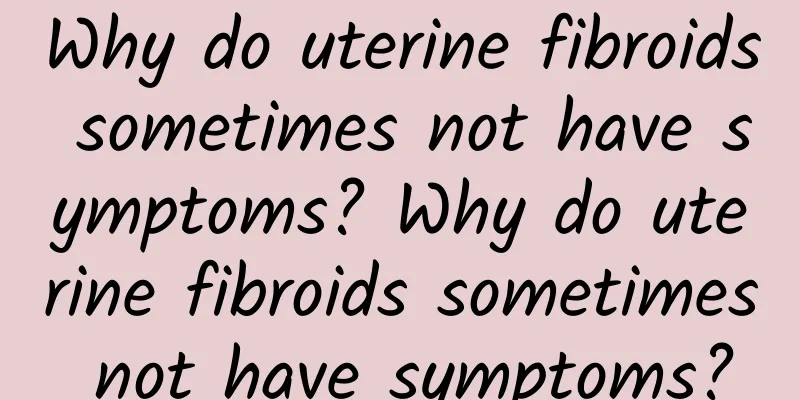Why do uterine fibroids sometimes not have symptoms? Why do uterine fibroids sometimes not have symptoms?

|
Why do uterine fibroids sometimes have no symptoms? Uterine fibroids are a common benign tumor in the female reproductive system. Most patients will experience some obvious symptoms. However, sometimes some patients do not have any obvious discomfort or symptoms. This makes people wonder why uterine fibroids sometimes have no symptoms? This article will explore this issue from multiple angles. 1. Tumor location: Endometrial fibroids can be located in various parts of the uterine wall, including the uterine diastolic myometrium, uterine submucosal layer, and uterine adenomyosis. If the uterine fibroid grows in a more marginal position of the uterus and is small in size, it may not cause much compression or interference to the surrounding tissues and organs, and therefore will not cause obvious symptoms. 2. Tumor size: Generally speaking, the larger the tumor, the greater the impact on surrounding tissues and organs, and the more obvious the symptoms. However, sometimes even if the uterine fibroids are large, due to their slow growth, the patient gradually adapts to its presence, resulting in no obvious symptoms. 3. Individual differences: Everyone's physical condition is different, including women with uterine fibroids. Some people may be more sensitive to symptoms such as pain and bleeding, while others may be numb or difficult to detect these symptoms. Therefore, even if two people have the same size uterine fibroids, the extent of their symptoms may be different. 4. Associated symptoms: Uterine fibroids may sometimes coexist with other gynecological problems, such as endometriosis, polycystic ovary syndrome, etc. The symptoms of these associated diseases may mask the symptoms of uterine fibroids, making them difficult to detect. 5. Age factor: Age also affects whether uterine fibroids have symptoms to a certain extent. Before menopause, most uterine fibroids will have obvious symptoms, but after menopause, due to the decrease in hormone levels, uterine fibroids may gradually shrink or stop growing, thereby alleviating or eliminating symptoms. However, if a patient has any of the following symptoms, they may need to be taken seriously and see a doctor promptly: - Irregular menstruation: The growth of uterine fibroids can affect the endometrium, leading to irregular menstruation, including symptoms such as prolonged menstruation and heavy menstrual flow. -Pelvic pain: The growth of fibroids compresses surrounding tissues and nerves, causing pelvic discomfort and pain, which may even radiate to the lower abdomen and lower back. - Frequent and urgent urination: When uterine fibroids compress the urethra, patients may urinate frequently and urgently. Although uterine fibroids may not have obvious symptoms, a gynecological examination is still required for diagnosis and treatment. Doctors can confirm the diagnosis through B-ultrasound, magnetic resonance imaging and other examinations. For patients with symptoms, medication, surgical resection and other measures may be considered to relieve symptoms and prevent further complications. Regardless of whether there are symptoms or not, female friends should pay attention to gynecological health, have regular physical examinations, and promptly detect and deal with potential problems to maintain physical health and well-being. |
Recommend
What happened if menopause came back again after one and a half years of menopause?
What happened if menopause came back again after ...
What are the causes and symptoms of benign ovarian cysts?
I don’t know if female friends have heard of beni...
10-year-old rice Miaoli No. 2 super soft Q
Taiwan has entered an aging society, and the nutr...
Who is not suitable for abortion?
Artificial abortion, also known as artificial abo...
What medicine can adults take to cure dysmenorrhea quickly?
What medicine can adults take to cure dysmenorrhe...
What factors will affect the time of yellow water flow after uterine curettage? Female friends should pay attention to these 3 factors that affect the time of yellow water flow.
After a uterine curettage, you will have yellow d...
How to effectively prevent dysmenorrhea in daily life?
In life, more and more patients with dysmenorrhea...
What are the dietary precautions after miscarriage? Here are 6 points
Within half a month after abortion, you can eat c...
Effect of TCM treatment on habitual abortion
Habitual miscarriage is called miscarriage in tra...
How long is the right time for painless abortion during pregnancy?
Painless abortion is currently favored by many yo...
What medicine should women use for cervical erosion? Common questions for patients with cervical erosion
We know that cervical erosion is a common gynecol...
Is interventional embolization effective for adenomyosis?
Interventional embolization is effective for aden...
5-pronged approach! The "LEARN" method for weight loss
Obesity is quickly becoming a national disease. T...
What are the sequelae of uterine fibroids laser surgery? What should be paid attention to after uterine fibroids laser surgery?
Uterine fibroids are a common gynecological disea...
Why is cervical erosion difficult to cure for a long time? There are four reasons why cervical erosion in women cannot be cured.
It is difficult to completely cure gynecological ...









